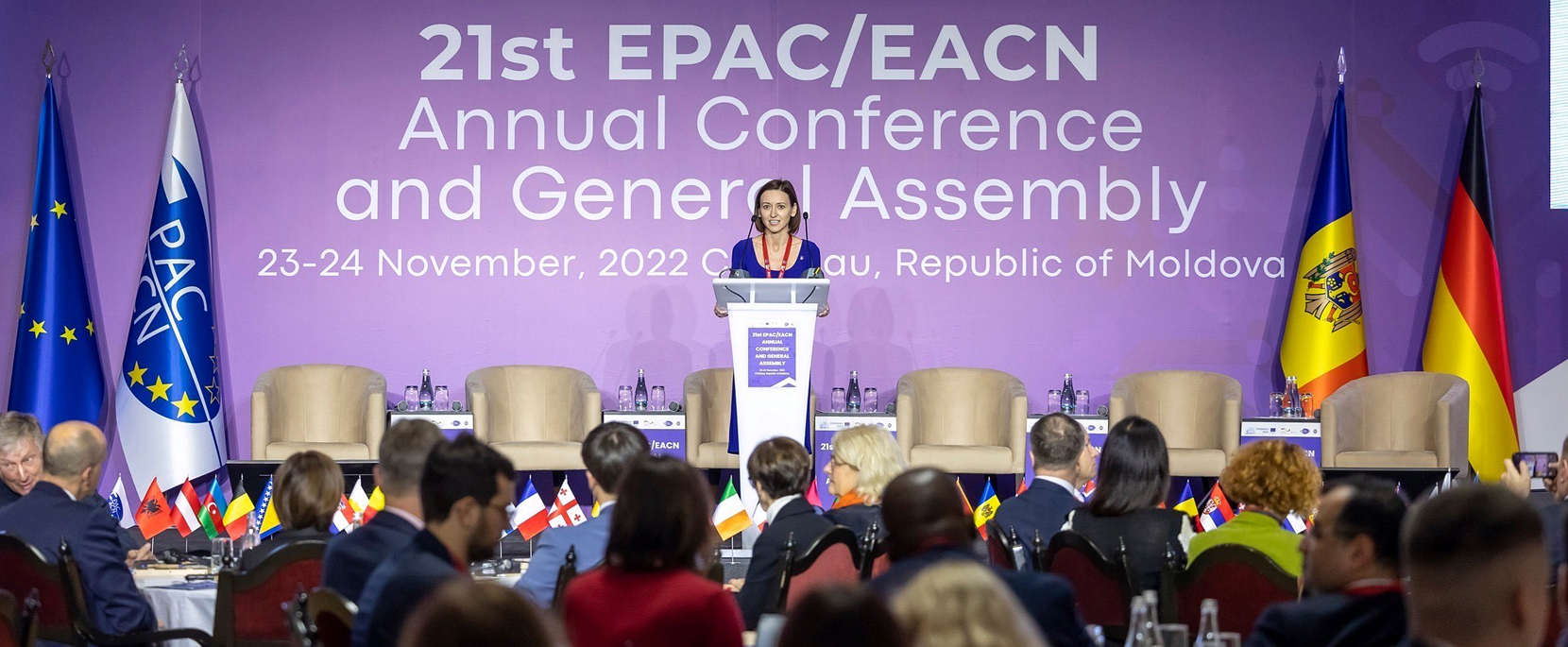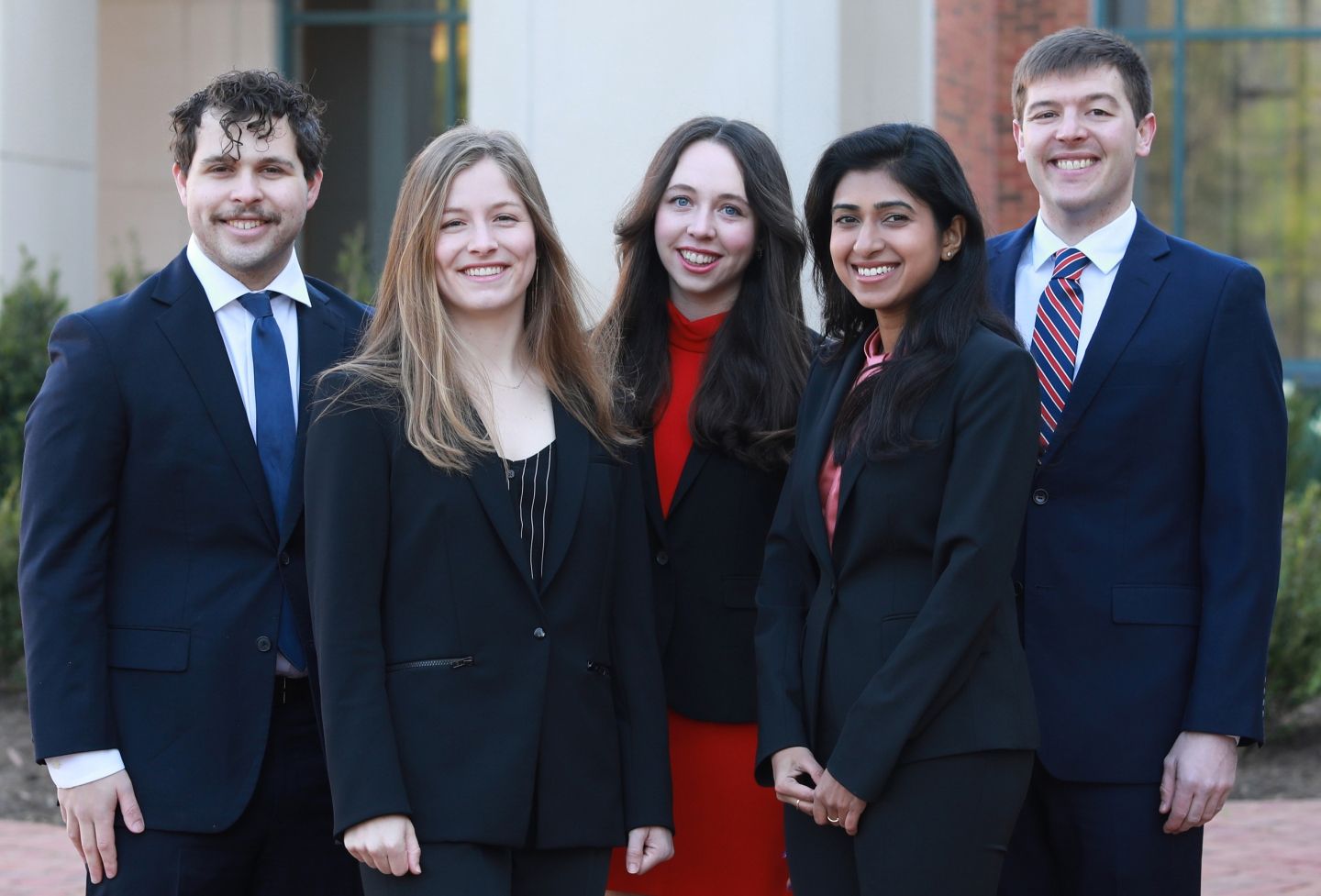Moldova, the former Soviet republic in Eastern Europe, is a country between a rock and several hard places.
It is the second-poorest nation in Europe, its economy mostly reliant on agriculture. To the north sits war-ravaged Ukraine; nearly three-quarters of a million Ukrainians have fled to Moldova since February 2022. Its prime minister resigned on Feb. 10, citing the stresses of working next to a war zone. Meanwhile, Russia occupies Transdniestria, a strip of territory in Moldova’s east.
And although Moldova is culturally aligned with Romania, Russia has not given up on returning Moldova’s 2.6 million people to its sphere of influence.
Not if Veronica Dragalin ’11 has anything to say about it.
Dragalin, who was born in Moldova 37 years ago, was appointed the country’s chief prosecutor for corruption last August. She left her work as an assistant U.S. attorney to take on the role.
It’s an important job. Moldova’s pending candidacy in the European Union is subject to nine conditions, six of which have to do with anti-corruption and justice reform, including more vigorous prosecution of systemic corruption.
“Moldova seems to have turned a corner toward [becoming] a truly democratic society not ruled by oligarchs or kleptocrats,” Dragalin said, speaking from her apartment in the capital, Chișinău. “Having the education and professional background that I did, when Moldova needed someone from the outside as chief prosecutor, I applied. It seemed like a big step to take, but if I didn’t, I felt I would regret it.”
She joined the prosecution office while the office of president is held by Maia Sandu, the former prime minister who in 2020 thwarted the reelection of the pro-Russian president and came into office vowing to fight corruption. Sandu’s pro-European Party of Action and Solidarity won the 2021 parliamentary elections by a landslide.
Dragalin’s predecessor was fired and is being investigated for abuse of office.
“One of the specific problems that Moldova is facing is corrupt judges and prosecutors,” she said. “It’s rare in the U.S., but here, corruption within the justice system is rampant. It’s hard to battle corruption while the system has corrupt actors.”
Moldova is ranked 91st out of the 180 countries surveyed by Transparency International for its Corruption Perceptions Index, lagging behind countries like Saudi Arabia and India.
In Dragalin’s first six months, there have been several successful investigations, using the same tools that investigators use in the U.S., such as recording meetings surreptitiously and intercepting phone calls. Several lawyers who were playing an intermediary role in negotiating bribes for officials were charged with “trafficking in influence.”
“In one case filed in January, we also charged a prosecutor for accepting a 10,000-euro bribe for a favorable decision on a criminal case,” Dragalin said.
“When someone asks for a bribe, instead of paying, we’re encouraging people to call and report it so we can catch them in the act,” she said. “There’s a lot of mistrust in the government, but not so much that people are not choosing to work with us.”
From Biology to Law
Dragalin’s path from Moldova to UVA and back to Moldova was circuitous and not always intentional.
Her parents, both mathematicians, left Moldova with young Veronica and her sister in the early 1990s. “The economic situation in Moldova at the time was pretty dire,” she said. “I was a child, so I didn’t know much about it, but my mom explained how she would stand in line for hours to get butter.”
Her father was awarded fellowships in Italy and Germany and then, in 1996, the family was able to come to the U.S. after winning a green card lottery. “My parents didn’t know anyone in the U.S., so it was quite a courageous decision. My mother was the age I am now when they moved,” Dragalin said.
 Dragalin speaks at the 21st EPAC/EACN Annual Conference and General Assembly in November 2022 in Moldova.
Dragalin speaks at the 21st EPAC/EACN Annual Conference and General Assembly in November 2022 in Moldova.
The family moved around, from Los Angeles to Rochester, New York, then to Philadelphia, where Dragalin finished high school. Her parents and sister have settled in the Philadelphia area.
After majoring in biology at Duke University—thinking maybe she would go into medical research—Dragalin took the LSAT and decided to give law a try.
“I wasn’t very methodical,” she said. “I think I had a fee waiver from UVA to apply to the Law School. I didn’t even visit before I was admitted, but it looked really nice in the brochures!”
It was a lucky choice. “I absolutely loved my time there. Now, having met others from other schools, not everyone is so lucky,” she said.
Friendships she made within her section continue to this day. “I played on a softball team with my section,” she said. “Some of us were terrible but we went out and had a good time.”
Anne Coughlin, the Lewis F. Powell, Jr., Professor of Law, stands out as an influence. “I fell in love with the whole way she presented what criminal law is. The core principles she presented were absolutely fascinating, like a crossover between law, crime and psychology. I developed an interest in the criminal law side of things with the idea of someday becoming a prosecutor.”
An internship with Jones Day led to a job offer after graduation. In Jones Day’s Los Angeles office, she worked with several former assistant U.S. attorneys who talked positively about their careers there, and they encouraged her to apply for positions with the U.S. Attorney’s Office in Los Angeles.
“Since my family moved around a lot, I’ve always gotten a lot of energy from making a fresh start,” Dragalin said. “After five years of being an associate, I was ready for something different.”
Trial, Error and Retrial
In 2016, she joined the U.S. Attorney’s Office in L.A. and eventually joined the Public Corruption and Civil Rights Section. One particular case confirmed for her that prosecuting official corruption was going to be her mission.
Several sheriff’s deputies had been charged with brutally beating a man who had been visiting his brother in jail, and then lying about it in their statements to the FBI. The men were tried separately. A jury acquitted one of the men on two of the charges, but hung on the third, making false statements. Dragalin was assigned the retrial on the third charge.
“Getting a case like that is very intimidating because I had to try to convince 12 people to come to a different conclusion than the last jury,” she said.
The man, who came from a law enforcement family, was found guilty at retrial. “After the trial, his family approached one of the FBI agents and asked to send a message to the prosecutors,” Dragalin said.
“People who act with impunity—corrupt politicians, law enforcement agents—bring a bad name to the badge and the great work the majority of people in those positions do. The family acknowledged us for the work we do as prosecutors when we are prosecuting our own.”
Thoughts of Moldova
After six years with the U.S. Attorney’s Office, it was time for another change, and that path led back to Moldova, where Dragalin spent childhood summers and where her grandmother and other extended family still live.
She had retained her knowledge of Romanian, the official language of Moldova, but “it’s one thing to speak with your grandmother, aunts and cousins, and another to have professional and public appearances in complex situations.” She adds, “I think my Romanian has improved a lot in the last six months.”
And Dragalin spends a lot of time in the public eye. “I had a warm reception, but I feel the pressure to deliver,” she said. “I just did a press conference this morning to set priorities for 2023 and review my first six months."
She is also establishing transparency as a key principle of her office.
“Before, when I was reading a press release on the prosecution website, it was very difficult for me to understand what was being communicated—it wasn’t telling a simple, clear story,” she said. “We have to articulate what we do in simple terms so people understand. There is no jury system here; all the cases go before judges. We suffer as a society when people in our country don’t understand what is happening in our criminal process.”
Ever mindful of the bigger picture, Dragalin sits on the government’s commission for EU integration, which is led by President Sandu.
“What our office is doing is very important toward Moldova’s future in wanting to join the EU,” she said. “When we succeed in demonstrating our ability to fight corruption, we will improve our chances of becoming an EU member state.”
Founded in 1819, the University of Virginia School of Law is the second-oldest continuously operating law school in the nation. Consistently ranked among the top law schools, Virginia is a world-renowned training ground for distinguished lawyers and public servants, instilling in them a commitment to leadership, integrity and community service.


